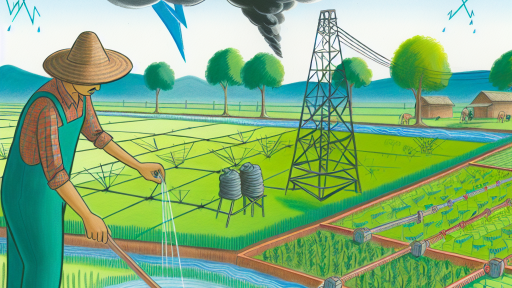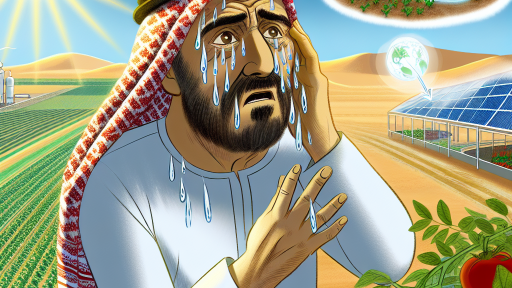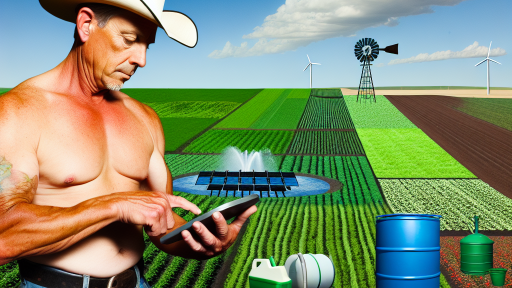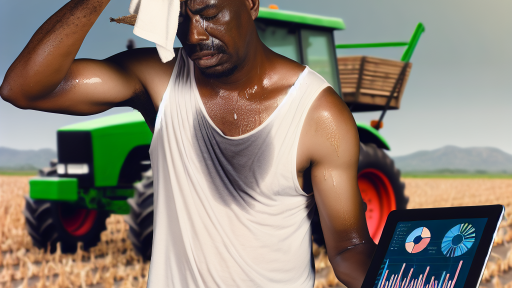Introduction to Agricultural Water Management
Agricultural water management is essential for sustainable farming practices.
It focuses on the efficient use of water resources for crop production.
Globally, fresh water scarcity affects agricultural output significantly.
As such, effective management becomes critical to ensure food security.
The Importance of Water Management
Water management enhances crop yields and food quality.
It also protects natural water resources from over-extraction.
In addition, smart management practices help combat drought effects.
Farmers can utilize advanced technologies to optimize water usage.
Challenges in Agricultural Water Management
Farmers face various challenges that impact water management.
Changing climate conditions lead to unpredictable rainfall patterns.
Over-reliance on groundwater can result in depletion of resources.
Moreover, inefficient irrigation systems can waste significant amounts of water.
Technological Solutions
Advanced technologies offer practical solutions to water management challenges.
Sensors and automation improve irrigation efficiency through real-time monitoring.
Precision agriculture allows for targeted water application based on crop needs.
Transform Your Agribusiness
Unlock your farm's potential with expert advice tailored to your needs. Get actionable steps that drive real results.
Get StartedFurthermore, data analytics can help farmers make informed decisions.
Policy and Community Engagement
Effective water management requires supportive policies from governments.
Community engagement plays a vital role in sustainable practices.
Public education can raise awareness about water conservation techniques.
Collaboration between farmers and organizations can enhance resource management.
Importance of Water Management in Agriculture
Foundation of Agricultural Sustainability
Water management is vital for sustainable agriculture.
It ensures crops receive adequate irrigation, promoting growth.
Proper water management helps maintain soil moisture levels.
Healthy soil supports plant health and productivity.
As a result, farmers can cultivate diverse crops efficiently.
Impact on Crop Yield
Effective water management directly influences crop yield.
Crops require precise water levels for optimal growth.
Inconsistent watering can lead to plant stress and reduced yields.
Additionally, proper irrigation systems reduce water waste.
This efficiency helps conserve essential resources for future use.
Economic Benefits
Efficient water management can significantly lower operational costs.
Farmers benefit from reduced water expenses and increased yields.
Moreover, proper irrigation practices can enhance product quality.
High-quality crops often command better market prices.
Consequently, farmers see improved profitability and sustainability.
Climate Resilience
Water management plays a crucial role in climate adaptation.
Farmers who manage water wisely can mitigate drought effects.
Moreover, effective practices prepare them for changing weather patterns.
Resilient agricultural systems support food security.
Showcase Your Farming Business
Publish your professional farming services profile on our blog for a one-time fee of $200 and reach a dedicated audience of farmers and agribusiness owners.
Publish Your ProfileThus, managing water effectively enhances community sustainability.
Supporting Biodiversity
Good water management practices promote biodiversity.
Diverse plant and animal species thrive in well-managed farms.
Practices such as crop rotation enhance ecosystem health.
Moreover, healthy ecosystems support natural pest control.
As a result, farmers can reduce chemical pesticide use.
Overview of Advanced Technologies in Water Management
Innovative Irrigation Techniques
Innovative irrigation techniques revolutionize water management in agriculture.
Drip irrigation delivers water directly to plant roots.
This method uses significantly less water compared to traditional systems.
Moreover, it minimizes weed growth and reduces water evaporation.
Sprinkler systems also provide flexibility in watering crops.
These systems can cover large areas and easily adapt to field conditions.
Remote Sensing Technologies
Remote sensing technologies enhance water management strategies.
Drones and satellites collect data on soil moisture levels.
This data informs the precise timing and amount of irrigation needed.
Farmers can monitor large areas swiftly and effectively.
Additionally, these technologies facilitate real-time decision-making.
Soil Moisture Sensors
Soil moisture sensors play a critical role in water management.
These devices measure the water content in the soil accurately.
Farmers can adjust irrigation schedules based on sensor readings.
This ensures crops receive optimal moisture levels throughout their growth.
Consequently, this technology leads to significant water conservation.
Automated Irrigation Systems
Automated irrigation systems increase efficiency in water usage.
These systems can be programmed to operate based on environmental conditions.
They reduce human error and improve crop yield consistency.
Farmers benefit from reduced labor costs while maintaining optimal crop health.
Furthermore, automated systems can integrate with weather forecasts for better planning.
Water Recycling and Reuse
Water recycling and reuse present sustainable solutions for agriculture.
Farmers can treat and repurpose wastewater for irrigation purposes.
This practice conserves freshwater resources and promotes sustainability.
Additionally, it reduces the cost of sourcing clean water for farming.
Implementing these systems can enhance the resilience of agricultural practices.
Gain More Insights: Climate Change And Agricultural Market Trends
Sensor Technologies and Their Role in Irrigation Management
Introduction to Sensor Technologies
Sensor technologies play a critical role in modern agriculture.
They provide real-time data to farmers about soil and water conditions.
This information allows for better decision-making regarding irrigation.
Types of Sensor Technologies
Several types of sensors assist with irrigation management.
Soyl moisture sensors measure the amount of water in the soil.
Weather sensors monitor rainfall, temperature, and humidity.
Lastly, flow sensors track the rate of water use in irrigation systems.
Showcase Your Farming Business
Publish your professional farming services profile on our blog for a one-time fee of $200 and reach a dedicated audience of farmers and agribusiness owners.
Publish Your ProfileSoyl Moisture Sensors
Soyl moisture sensors help farmers evaluate the water needs of crops.
They can reduce water waste by providing precise measurements.
Moreover, they promote healthier plant growth through optimal watering.
Weather Sensors
Weather sensors provide essential data for irrigation planning.
They help farmers understand when to irrigate based on environmental conditions.
This knowledge can prevent over- or under-irrigation.
Flow Sensors
Flow sensors measure the volume of water used in irrigation systems.
By monitoring water usage, farmers can identify inefficiencies.
Such data supports better management practices and water conservation.
Benefits of Using Sensors in Irrigation
Implementing sensor technologies offers numerous benefits for farmers.
First, they help optimize water usage, conserving this vital resource.
Second, sensors improve crop yields due to precise irrigation.
Additionally, they enable timely responses to changing environmental conditions.
Challenges in Implementing Sensor Technologies
Despite their benefits, farmers face challenges when using sensor technologies.
Initial costs can be high, discouraging adoption.
Additionally, some farmers may lack the technical knowledge necessary.
Moreover, data management can be complex without proper systems in place.
Future Directions for Sensor Technologies
The future of sensor technologies in irrigation management looks promising.
Advancements in technology will increase sensor accuracy and affordability.
Furthermore, integration with smart farming solutions will enhance user experience.
As awareness grows, more farmers will adopt these technologies.
Delve into the Subject: Climate-Resilient Farming Practices to Save Water
Precision Agriculture: Data-Driven Approaches to Water Use
Introduction to Precision Agriculture
Precision agriculture enhances farming efficiency through technology.
This approach utilizes data to optimize water use.
Farmers can manage resources more sustainably.
Utilizing Data for Water Management
Farmers collect data on soil moisture levels.
This data informs irrigation practices effectively.
Technologies such as sensors measure environmental conditions.
Additionally, satellite imagery assists in monitoring crop health.
Types of Data Used
Several key data types improve water management.
- Soil moisture content
- Weather patterns
- Crop growth rates
These types provide farmers with insights into water needs.
Technologies Supporting Precision Agriculture
Various technologies support precision agriculture initiatives.
Remote sensing technology captures vital information quickly.
Drones offer detailed aerial views of farms.
Farm management systems integrate data for decision-making.
Implementing Irrigation Technologies
Smart irrigation systems respond to environmental changes.
These systems reduce water waste significantly.
- Drip irrigation delivers water directly to roots.
- Automated sprinklers adjust based on soil moisture.
Such technologies ensure efficient water use during critical growth phases.
Benefits of Data-Driven Water Management
Data-driven approaches yield numerous benefits for farmers.
They enhance crop yields while conserving resources.
Showcase Your Farming Business
Publish your professional farming services profile on our blog for a one-time fee of $200 and reach a dedicated audience of farmers and agribusiness owners.
Publish Your ProfileMoreover, they contribute to reducing operational costs.
Ultimately, these practices support sustainable agriculture methods.
See Related Content: Impact of Greenhouse Gases on Agricultural Productivity
Automated Irrigation Systems and Smart Controllers
Overview of Automated Irrigation Systems
Automated irrigation systems revolutionize traditional farming practices.
They offer precise control over water application.
This technology reduces water waste significantly.
Farmers can schedule irrigation based on weather conditions.
Components of Automated Irrigation Systems
Several key components make these systems efficient.
- Soil moisture sensors monitor soil conditions.
- Drip irrigation pipes deliver water directly to plants.
- Control valves manage the flow of water.
- Weather stations provide real-time climate data.
Benefits of Smart Controllers
Smart controllers enhance the efficiency of irrigation systems.
They adjust watering schedules automatically.
This technology saves significant amounts of water.
Additionally, it prevents overwatering.
Implementation of Smart Controllers
Installing smart controllers is straightforward for farmers.
They integrate seamlessly with existing irrigation systems.
Farmers should choose controllers compatible with their equipment.
Future of Automated Irrigation Technologies
The future looks promising for automated irrigation technologies.
Advancements in artificial intelligence will further enhance precision.
Moreover, data analytics will inform more effective management practices.
This evolution supports sustainable agricultural practices as well.
Gain More Insights: Climate Change Effects On Farm Profitability
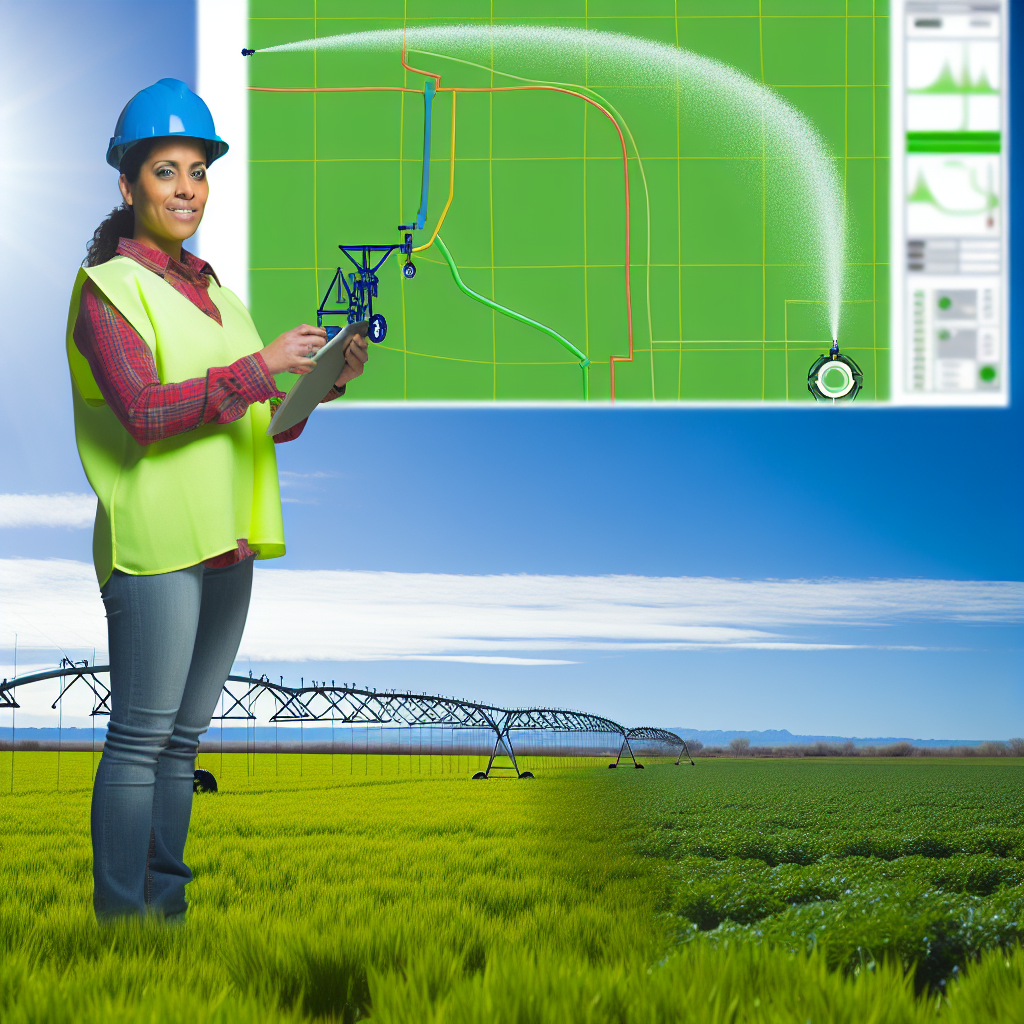
Role of Drones and Remote Sensing in Water Monitoring
Introduction to Drone Technology
Drones have transformed the way farmers manage water resources.
Farmers now leverage drones for efficient monitoring of crops and water distribution.
This technology enables real-time data collection and analysis.
Advantages of Using Drones for Water Monitoring
Drones provide high-resolution aerial imagery of agricultural fields.
Farmers can identify water stress areas quickly using this imagery.
Moreover, drones help reduce labor costs associated with manual inspections.
They enable farmers to cover large areas in a short amount of time.
Remote Sensing Technology
Remote sensing involves collecting data from a distance, typically using satellites or drones.
This technology analyzes soil moisture levels effectively.
Farmers can assess water availability and make informed irrigation decisions.
Remote sensing also helps in detecting leaks in irrigation systems.
Integration of Drones with Remote Sensing
Combining drones and remote sensing enhances precision agriculture practices.
This integration allows for detailed mapping of water resources.
Furthermore, it helps optimize irrigation schedules based on real-time data.
Case Studies and Real-World Applications
Agriculture companies like AgEagle have pioneered the use of drone technology.
They enable farmers to monitor soil and plant health efficiently.
Similarly, Skycatch offers solutions for detailed aerial surveys using drones.
Results show improved crop yields and reduced water usage in pilot projects.
Challenges and Considerations
Implementing drone technology requires technical know-how and training.
Farmers must also consider regulatory restrictions on drone use.
Showcase Your Farming Business
Publish your professional farming services profile on our blog for a one-time fee of $200 and reach a dedicated audience of farmers and agribusiness owners.
Publish Your ProfileAdditionally, data interpretation requires specific skills and software.
Future of Drones in Agricultural Water Management
The future looks promising with advancements in drone technology.
Developments include better sensors and improved analytics software.
Ultimately, enhanced drone capabilities will further aid sustainable water management.
Rainwater Harvesting: Innovative Techniques and Technologies
Introduction to Rainwater Harvesting
Rainwater harvesting is an essential practice in modern agriculture.
This method collects and stores rainwater for agricultural use.
It offers a sustainable solution to water scarcity challenges.
Importance of Rainwater Harvesting
This technique enhances water availability during dry spells.
It reduces the dependency on groundwater sources.
Furthermore, rainwater harvesting promotes self-sufficiency among farmers.
Innovative Techniques in Rainwater Harvesting
Surface Harvesting
Surface harvesting involves collecting rainwater from rooftops.
This technique utilizes gutters and downspouts for efficient collection.
Farmers can store harvested water in cisterns or tanks.
Contour Farming
Contour farming follows the natural contours of the land.
This method slows down runoff, allowing more water absorption.
Farmers create trenches and bunds to capture rainwater effectively.
Check Dams
Check dams are small barriers built across streams.
They slow down water flow, promoting water seepage into the ground.
This technique helps recharge groundwater levels significantly.
Technological Advancements in Rainwater Harvesting
Smart Sensors
Smart sensors monitor rainfall and water levels in storage tanks.
They provide real-time data for better management decisions.
Farmers can optimize their water usage based on the data received.
Automated Systems
Automated systems enhance the efficiency of rainwater harvesting.
These systems control the flow of water to different agricultural areas.
They reduce labor costs and improve precision in irrigation.
Challenges and Solutions
Contamination Risks
Rainwater can be contaminated by pollutants from roofs.
Regular maintenance and filtration systems are essential to mitigate this risk.
Farmers should ensure the cleanliness of collection surfaces.
Cost of Implementation
The initial setup for rainwater harvesting systems can be high.
However, various funding options and government incentives are available.
Farmers can gradually recover costs through enhanced water efficiency.
Future of Rainwater Harvesting
Innovative approaches will continue to evolve in this field.
Collaboration among farmers, researchers, and technologists is crucial.
Ultimately, rainwater harvesting will play a vital role in sustainable agriculture.
Impact of Climate Change on Water Resources in Agriculture
Changing Precipitation Patterns
Climate change alters precipitation patterns significantly.
Regions often experience increased rainfall variability.
Some areas face prolonged droughts while others encounter intense storms.
Such changes can lead to water scarcity for agriculture.
Farmers struggle to plan effectively due to inconsistent water supply.
Temperature Fluctuations
Climate change raises average global temperatures consistently.
Showcase Your Farming Business
Publish your professional farming services profile on our blog for a one-time fee of $200 and reach a dedicated audience of farmers and agribusiness owners.
Publish Your ProfileHigher temperatures increase evaporation rates from soil and water bodies.
This can exacerbate water scarcity in already vulnerable areas.
Moreover, crop water requirements fluctuate with temperature increases.
Farmers must adapt their irrigation practices accordingly.
Impact on Crop Yields
Water availability significantly affects crop yields directly.
Reduced water supply can hinder plant growth and productivity.
Conversely, excessive water from storms can damage crops.
Farmers face challenges in maintaining optimal growing conditions.
As a result, food security becomes a pressing concern.
Soil Degradation
Inadequate water management leads to soil degradation risks.
Soil erosion occurs more frequently due to heavy rainfall.
Additionally, droughts can cause soil compaction and fertility loss.
Healthy soil is crucial for sustainable agricultural practices.
Farmers must implement strategies to protect soil health.
Water Resource Management Strategies
Adapting to climate impacts requires innovative water management strategies.
Farmers can implement rainwater harvesting systems effectively.
Such systems capture and store rainwater for irrigation use.
Drip irrigation technology ensures efficient water usage for crops.
Furthermore, crop rotations can improve soil moisture retention.
Future Trends in Agricultural Water Management Technologies
Emerging Technologies
Emerging technologies revolutionize agricultural water management.
Innovations in IoT enhance water usage efficiency.
Farmers utilize smart sensors for real-time monitoring.
Drones deliver precise irrigation assessments and applications.
Meanwhile, AI algorithms analyze vast datasets for optimal decision-making.
Water-Saving Techniques
New water-saving techniques gain prominence among farmers.
Drip irrigation systems minimize water wastage significantly.
Conservation tillage practices improve water retention in soil.
Rainwater harvesting systems offer sustainable water sources.
Data Analytics and Monitoring
Data analytics plays a crucial role in water management.
Farmers leverage big data to forecast water needs accurately.
Predictive analytics allows for anticipating drought and flood conditions.
Moreover, mobile apps streamline monitoring irrigation schedules.
Regulatory Changes and Policies
Regulatory changes promote advanced water management practices.
Governments implement incentives for sustainable usage.
Policy frameworks encourage innovation in agricultural technologies.
Certainly, partnerships between private and public sectors foster progress.
Educational Initiatives and Training
Educational initiatives equip farmers with necessary skills.
Workshops and seminars focus on new technologies and methods.
Online platforms offer resources for self-paced learning.
Additionally, knowledge-sharing networks enhance community practices.
Showcase Your Farming Business
Publish your professional farming services profile on our blog for a one-time fee of $200 and reach a dedicated audience of farmers and agribusiness owners.
Publish Your ProfileSustainable Practices Integration
Integrating sustainable practices is essential for future viability.
Farmers adopt integrated water resource management strategies.
These practices promote ecological balance while maximizing yield.
Ultimately, sustainable practices ensure resources for future generations.
Additional Resources
Water Conservation in Irrigated Agriculture: Trends and Challenges …

